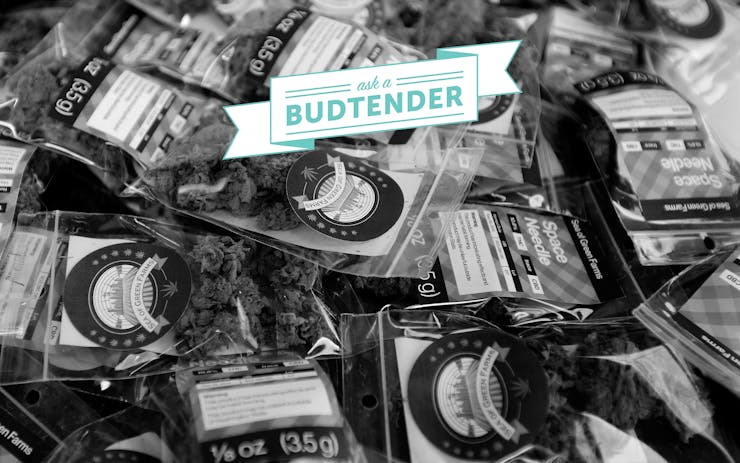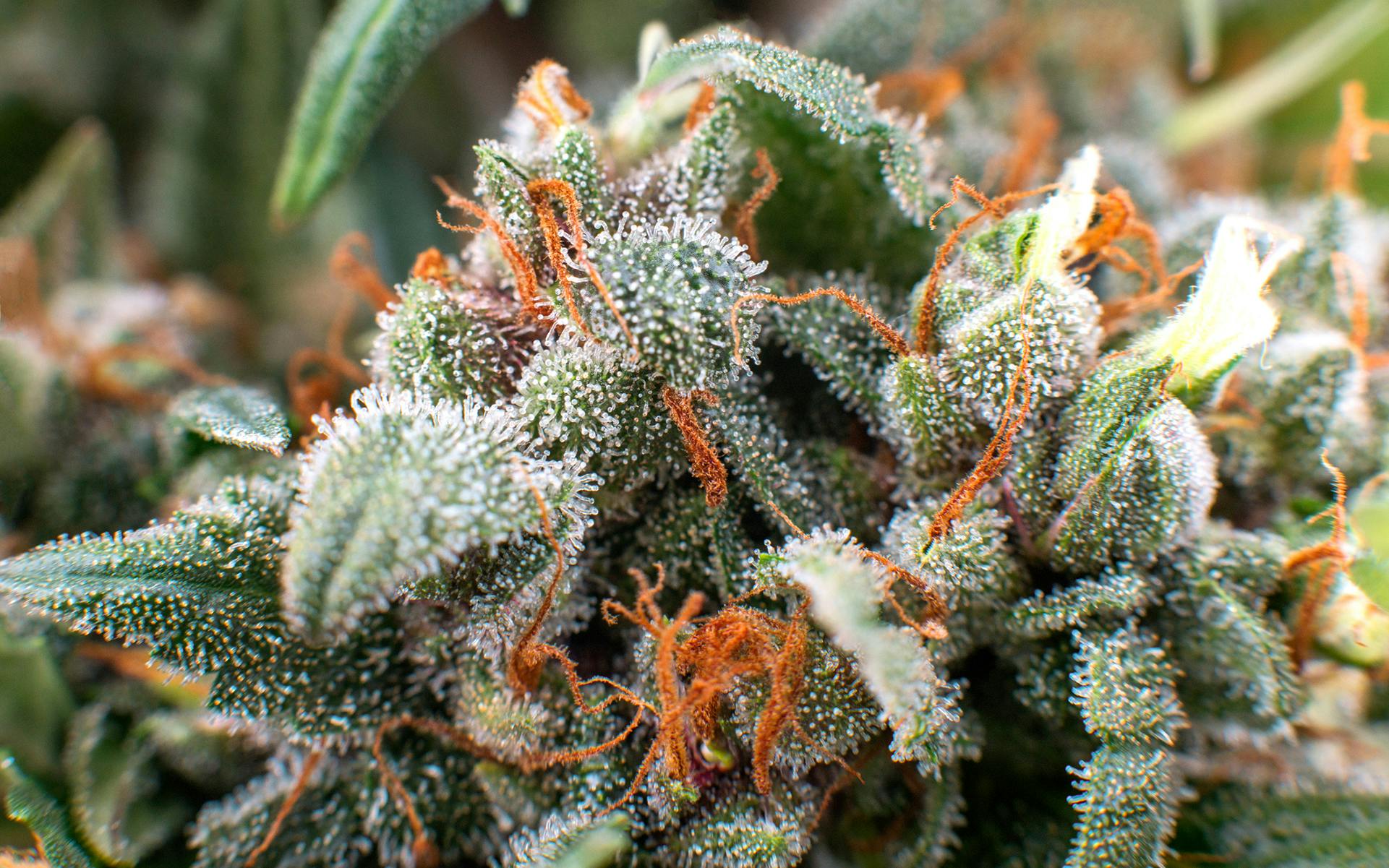In any retail industry, the way an item looks on the shelf has everything to do with its sales. With cannabis, the product should not only appeal to consumers aesthetically, it also needs to maintain freshness, flavor, and potency. In legal adult-use states such as here in Washington, it’s taken a good deal of time as well as trial and error to iron out the kinks of perfect cannabis packaging.
Browse the Latest Cannabis Products
Fortunately, as the industry matures, it has become much easier to find quality cannabis products packaged effectively, cleanly, and sustainably by reliable companies. In fact, you might even find yourself overwhelmed by the vast selection. These industry insider tips, assembled based on the options I’ve seen as a budtender, should help curious consumers and packaging processors alike.
1. Glass is a popular, effective cannabis packaging material
If you’re on the hunt for cannabis flower, one of the more important things is to look for glass containers—instead of plastic bags. Glass is non-porous material, giving your cannabis a longer shelf life. It also protects buds from smashing.
2. Glass cannabis packaging gives you a better look at your strain
Glass packaging usually means a more visible product—a very critical component of the purchasing decision, especially in states where containers must stay fully sealed until after the purchase. Without a clear view of the product (which is available in some plastic packaging as well), the customer is left with essentially no sense to rely on but a gut feeling when it comes to choosing the right strain. This is especially important for consumers in states like Washington, where one cannot smell or closely examine a bud from a large sample jar.
3. For the environmentally conscious, go with glass or biodegradable packaging
Not only is glass your best bet for ensuring freshness and flavor, it’s an important environmental choice as well; approximately 82% of glass is recycled annually compared to only approximately 33% of plastic packaging. Additionally, glass is endlessly and 100% recyclable, whereas PET (polyethylene terephthalate, the most commonly used plastic polymer in packaging) is only partially recyclable and can only be recycled a certain number of times. By purchasing cannabis packaged in glass containers, you can help yourself and the planet at the same time.
Speaking from a sustainability standpoint, it’s important to mention fully biodegradable packaging as well. Take Soulshine Cannabis, a processor based out of Renton, Washington, for example. Not only is all of their packaging 100% compostable and biodegradable, they also donate a percentage of their profits to Emerald City Pet Rescue, a local animal shelter in Seattle. Talk about cannabis for a higher purpose!
4. For cannabis concentrates, medical-grade silicone-lined or glass packaging is ideal
When it comes to concentrates, good packaging still means product visibility and preserving freshness, but it also means accessibility: there’s little more frustrating than purchasing a gram of oil and only being able to scrape 80% of it off of parchment paper or plastic jars. What to look for in these situations is highly dependent on the consistency and texture of the product; if you have a knowledgeable budtender, they should be able to help walk you through what different terms (wax, shatter, crumble, distillate, etc.) mean in reference to consistency and extraction method if you aren’t already familiar.
In my personal experience, the best concentrate packaging for almost all types is a dab container (glass or plastic are both fine here) with an insert made of medical-grade silicone. The silicone serves two purposes:
- To ensure that consumers are able to get all of the product out of the package
- To form a block between product and plastic to prevent chemical leaching and/or scratching glass particles into the container
Unbleached parchment paper is another generally reliable packaging method, but it has drawbacks which stem mainly from an inability to clearly view the product before purchasing it. If you’re cautious to try a particular brand or strain, ask your budtender for their feedback.
5. Detailed labeling is especially important for concentrate packaging
Concentrate connoisseurs will be looking at the same packages as those who are looking to take their first dab, so it’s important for companies to find the balance when it comes to including information on packaging. I have found that people tend to prefer companies that test for terpene profiles as well as potency, and the few companies that include their residual solvent analyses on packages sell well because consumers know exactly how clean the product they’re getting will be.
Oleum Extracts from Auburn, Washington is an exemplary brand when it comes to concentrate packaging. They package with a silicone insert which makes their product easily accessible, and they also include terpene results so that buyers know what flavor to expect. Another company to keep an eye out for is Errl’s, based out of northern Washington. They package all of their concentrates in either sturdy, thick glass containers or silicone slick sheets (in lieu of parchment paper), depending on that product’s consistency.
Lastly, be sure to ask your budtenders about their favorite brands as well! Different stores carry different products, and there are many more great companies available aside from the ones I have mentioned here.
6. Explore new cannabis brands and find your favorites
The number of brands available to choose from when purchasing flower can be overwhelming, but after budtending in the adult-use industry, I have definitely noticed some standout companies that may help narrow down the choices. Coastal Cannabis and Seattle Green Bud, both based out of Seattle, are two of my favorite examples of quality, sustainable packaging. Seattle Green Bud packages in unique, hexagonal glass jars that feature bold artwork on the label.
This, combined with visible information on effects and sativa/indica dominance, attracts customers to their product. Adding a little insight as to what the high can be like is valuable, especially to novice consumers who may be less familiar with cannabis terminology.
Other companies with stellar packaging practices definitely deserve a mention here as well. Gold Leaf Gardens and Seattle’s Private Reserve have roots in the medical industry predating the legal adult market, and have been reliable from the onset of recreational sales. Famous for their Peppermint Cookies and Tangie strains, Gold Leaf packages all of their flower in glass jars sealed with biodegradable cork, and their larger quantities (half and full ounces) come in packages wrapped with a length of hemp wick to ensure the best flavor. Seattle’s Private Reserve has developed some seriously powerful and flavorful new strains (including the happy genetic accident Lemonder), and they package large quantities in sturdy glass as well.
While there may not be a definite “best” way to package cannabis products, these tips can help you know where to start when it comes time to shop. Remember that you’re always going to be the best judge of what is the right product for you, and that each experience with cannabis is unique. Lastly, never hesitate to ask your budtender for help or suggestions – after all, you’re the reason we’re here!






